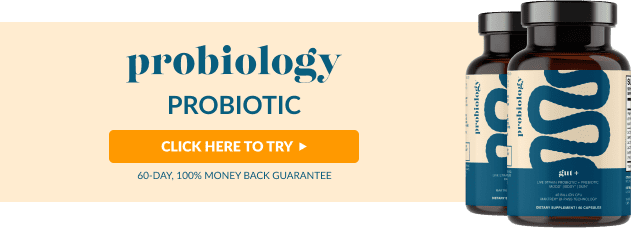And Should You Be Taking Them?
It may be common knowledge that probiotics are great for digestive health – but what if you’ve been diagnosed with a particular digestive issue like SIBO? Should you take them then?
That’s what this article is going to explore in particular today.
But before we begin, it would only be prudent to clarify exactly what SIBO is and what SIBO probiotics are.
What Exactly Is SIBO?
SIBO stands for Small Intestinal Bacterial Overgrowth. And as its name suggests, it’s basically an issue with your small intestine where bacteria have overgrown.
For those who don’t already know, your body contains a lot of good bacteria. Most of this good bacteria are meant to be in the large intestine (colon), rather than the small intestine.
There they carry out lots of important functions, such as helping the body to digest food, helping to regulate your immune system, helping to regulate blood sugar levels, and more. Read more about the function of colon in digestive system.
Occasionally, this good bacteria will become displaced and find itself where it shouldn’t be, in the small intestine.
The small intestine is meant to be relatively sterile, hosting a far lower amount of bacteria than is held in the large intestine.
And when these bacteria find themselves in the small intestine, it tends to overgrow, which causes an overgrowth of bacteria in the small intestine, and this is referred to as SIBO.
What Are SIBO Probiotics?
What we mean by SIBO probiotics, are probiotics supplements that are taken to help treat SIBO.
What Are The Symptoms Of SIBO?
Having an excess growth of bacteria in your small intestine can bring about all kinds of uncomfortable symptoms. These can vary from person to person, but can include any of the following:
- Bloating
- Abdominal pain
- Diarrhea
- Excessive gas
- Constipation
- Burping
If you are already familiar with IBS (Irritable Bowel Syndrome), then you may well notice that nearly every symptom of IBS is also a symptom of SIBO. The two conditions are highly associated with each other.
It’s also very important to note at this point that SIBO can cause nutrient deficiencies.
This is because the small intestine is responsible for the absorption of important nutrients, and if there is bacterial overgrowth in the small intestine, then this can interfere with the process of nutrient absorption. These nutrient deficiencies aren’t as easy to spot as the other SIBO symptoms.
So, as you can see this excessive growth of bacteria in the small intestine can cause all sorts of uncomfortable digestive problems and discomfort, and possibly even nutrient deficiencies.
How Is SIBO Diagnosed?
If you suspect that you may have SIBO, the first step in getting a diagnosis, or ruling it out, is to book an SIBO test with your healthcare practitioner.
This is a breath test that identifies different gases produced in your body by an overgrowth of bacteria. If too much of this gas is produced, this suggests that there is in fact an overgrowth of bacteria in your small intestine.
It’s important to note at this point, however, that these SIBO tests are far from perfect. In fact, Lucy Mailing goes so far as to say that breath testing does not accurately diagnose SIBO.
And because of this many healthcare practitioners will go ahead and treat suspected SIBO without bothering with the SIBO breath test.
If you feel that you may have SIBO, it is important that you consult with a healthcare professional, but they may decide that a breath test is unnecessary. Though there is certainly no harm in getting one done.
How Do You Treat SIBO?
As you may already imagine, the key to treating SIBO is to rid the small intestine of its infestation of bacteria.
There are two possible ways of doing this.
- You could go down the pharmaceutical route, and follow a prescription of antibiotics, such as neomycin or rifaximin.
- Or you could go down the herbal route, and take herbal treatments such as berberine and/or oregano oil.
The aim of both options is to decrease the amount of bacteria that have taken hold in the small intestine.
Should You Be Taking SIBO Probiotics? Yes or No
You know what? Taking SIBO probiotics may sound quite counterproductive when first put out there. Because probiotics adds bacteria to your system rather than removes it. So you may well be inclined to think that you should not take probiotics to treat your SIBO….
However, there has been growing evidence to suggest that taking probiotics can actually help to treat those with SIBO. When those with SIBO take probiotics, this reduces the amount of bacteria in their small intestine.
Unfortunately, however, we still don’t really understand exactly why this is the case. But then you don’t really need to understand the mechanics of it in order to reap the benefits. If it works, don’t knock it.
But, in order to give you more confidence in this tack, we’re going to present you with some of the evidence we’ve come across.
Examination Of The Evidence Encouraging The Use of SIBO Probiotics
One study compared two groups of SIBO sufferers, and after 6 months of one group receiving treatment with probiotics, 99% of that group tested negative for SIBO, whereas a smaller proportion (67%) of the group that did not have this treatment tested negative. Not exactly definitive, but encouraging nonetheless.
Some of the more substantial evidence comes from a thorough meta-analysis of 18 separate studies.
This found that the use of probiotics alone was 53.2% effective against SIBO, whereas the effectiveness of treatment by antibiotics alone comes in at 51.1%. So treatment by probiotics seems ever so slightly more effective than treatment by antibiotics.
But the best results came when antibiotic treatment was combined with probiotics. In this instance, the SIBO was cleared at a rate of a whopping 85.5%.
There is clearly a case, then, for taking both antibiotics and probiotics together for a swifter, more effective treatment.
And that’s not all. In addition to producing negative breath test results, it was also concluded that taking SIBO probiotics also reduces one of the more uncomfortable of the SIBO symptoms, abdominal pain.
SIBO Probiotics Final Thoughts
SIBO can be a very unpleasant and uncomfortable illness for its sufferers, and with such poor testing, it can be difficult enough just to determine whether or not you even have SIBO in the first place.
However, if you do have SIBO one of the most effective ways of treating it would be to follow a course of antibiotics, while also taking SIBO probiotics.
However, sadly we cannot predict for certain that it would definitely be successful. But there’s a good sign that taking probiotics can help.

For more related articles, check these out:

